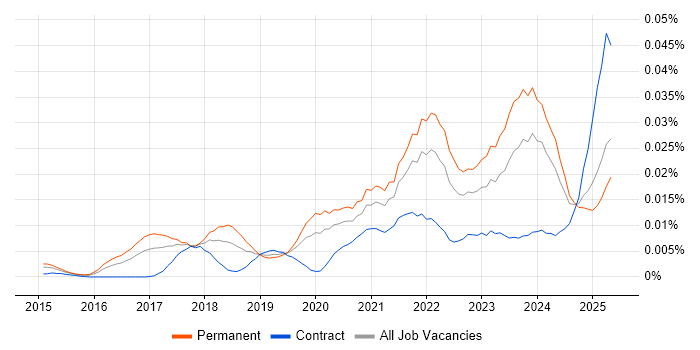Industrial Internet of Things (IIoT)
UK
The table below looks at the prevalence of the term Industrial Internet of Things in permanent job vacancies. Included is a benchmarking guide to the salaries offered in vacancies that cited Industrial Internet of Things over the 6 months leading up to 30 May 2025, comparing them to the same period in the previous two years.
| 6 months to 30 May 2025 |
Same period 2024 | Same period 2023 | |
|---|---|---|---|
| Rank | 702 | 871 | 939 |
| Rank change year-on-year | +169 | +68 | +239 |
| Permanent jobs citing Industrial Internet of Things | 7 | 41 | 23 |
| As % of all permanent jobs advertised in the UK | 0.013% | 0.040% | 0.024% |
| As % of the Miscellaneous category | 0.034% | 0.12% | 0.054% |
| Number of salaries quoted | 6 | 29 | 18 |
| 10th Percentile | £71,875 | - | £47,500 |
| 25th Percentile | £74,375 | - | £54,750 |
| Median annual salary (50th Percentile) | £78,750 | £52,084 | £63,750 |
| Median % change year-on-year | +51.20% | -18.30% | +6.25% |
| 75th Percentile | £84,938 | - | £87,500 |
| 90th Percentile | £86,625 | £57,500 | £88,750 |
| UK excluding London median annual salary | £80,750 | £52,084 | £62,500 |
| % change year-on-year | +55.04% | -16.67% | +57.23% |
All Generic Skills
UK
Industrial Internet of Things falls under the General and Transferable Skills category. For comparison with the information above, the following table provides summary statistics for all permanent job vacancies requiring generic IT skills.
| Permanent vacancies with a requirement for generic IT skills | 20,604 | 35,638 | 42,318 |
| As % of all permanent jobs advertised in the UK | 37.19% | 34.51% | 43.55% |
| Number of salaries quoted | 9,493 | 23,121 | 22,633 |
| 10th Percentile | £31,250 | £28,000 | £35,750 |
| 25th Percentile | £42,000 | £38,084 | £46,350 |
| Median annual salary (50th Percentile) | £60,000 | £55,000 | £65,000 |
| Median % change year-on-year | +9.09% | -15.38% | +4.00% |
| 75th Percentile | £78,750 | £75,000 | £86,250 |
| 90th Percentile | £110,000 | £97,500 | £110,000 |
| UK excluding London median annual salary | £55,000 | £50,000 | £55,000 |
| % change year-on-year | +10.00% | -9.09% | +4.76% |
Industrial Internet of Things
Job Vacancy Trend
Job postings citing Industrial Internet of Things as a proportion of all IT jobs advertised.

Industrial Internet of Things
Salary Trend
3-month moving average salary quoted in jobs citing Industrial Internet of Things.
Industrial Internet of Things
Top 8 Job Locations
The table below looks at the demand and provides a guide to the median salaries quoted in IT jobs citing Industrial Internet of Things within the UK over the 6 months to 30 May 2025. The 'Rank Change' column provides an indication of the change in demand within each location based on the same 6 month period last year.
| Location | Rank Change on Same Period Last Year |
Matching Permanent IT Job Ads |
Median Salary Past 6 Months |
Median Salary % Change on Same Period Last Year |
Live Jobs |
|---|---|---|---|---|---|
| England | +126 | 7 | £78,750 | +51.20% | 18 |
| UK excluding London | +158 | 5 | £80,750 | +55.04% | 16 |
| Work from Home | - | 4 | £80,000 | - | 2 |
| South East | - | 3 | £80,000 | - | 5 |
| London | - | 2 | £76,250 | - | 4 |
| Midlands | +81 | 1 | £81,500 | +48.18% | |
| West Midlands | +53 | 1 | £81,500 | +48.18% | |
| East of England | - | 1 | - | - | 3 |
Industrial Internet of Things
Co-occurring Skills and Capabilities by Category
The follow tables expand on the table above by listing co-occurrences grouped by category. The same employment type, locality and period is covered with up to 20 co-occurrences shown in each of the following categories:
